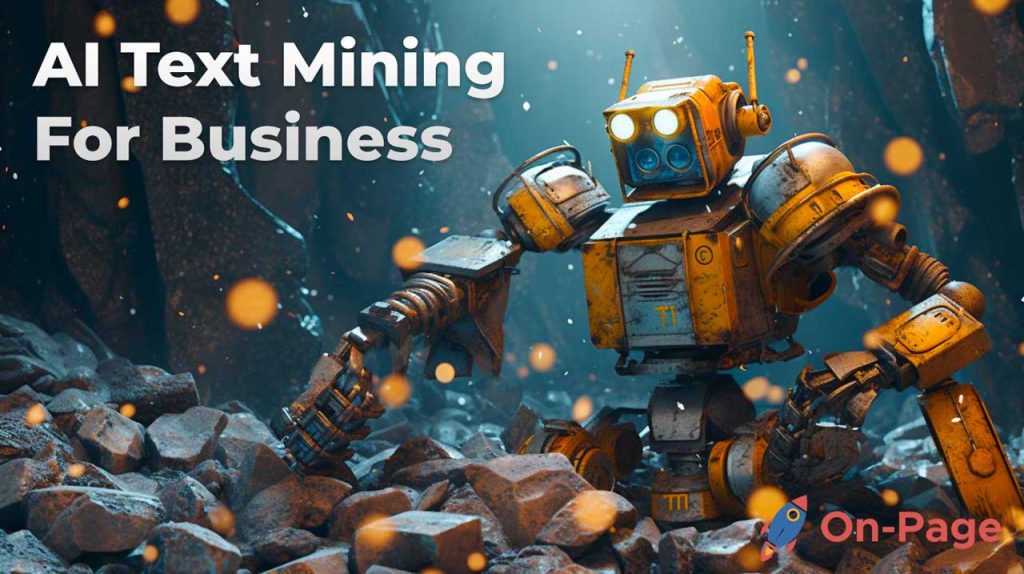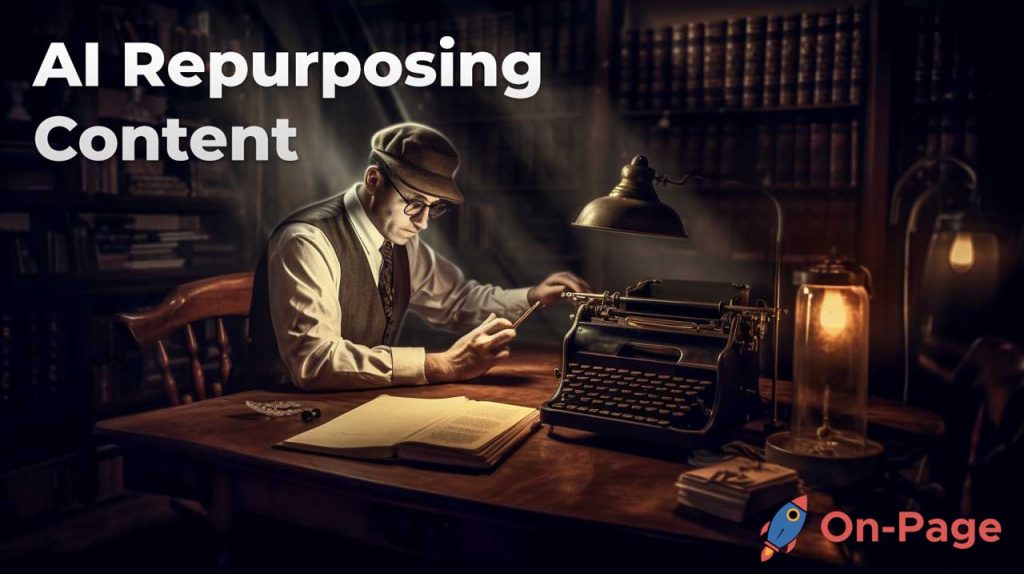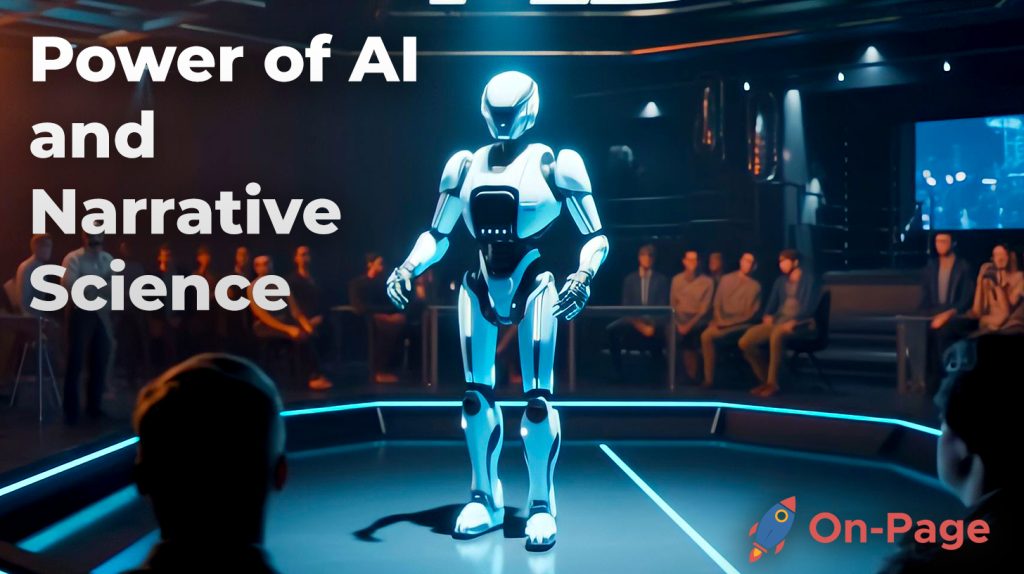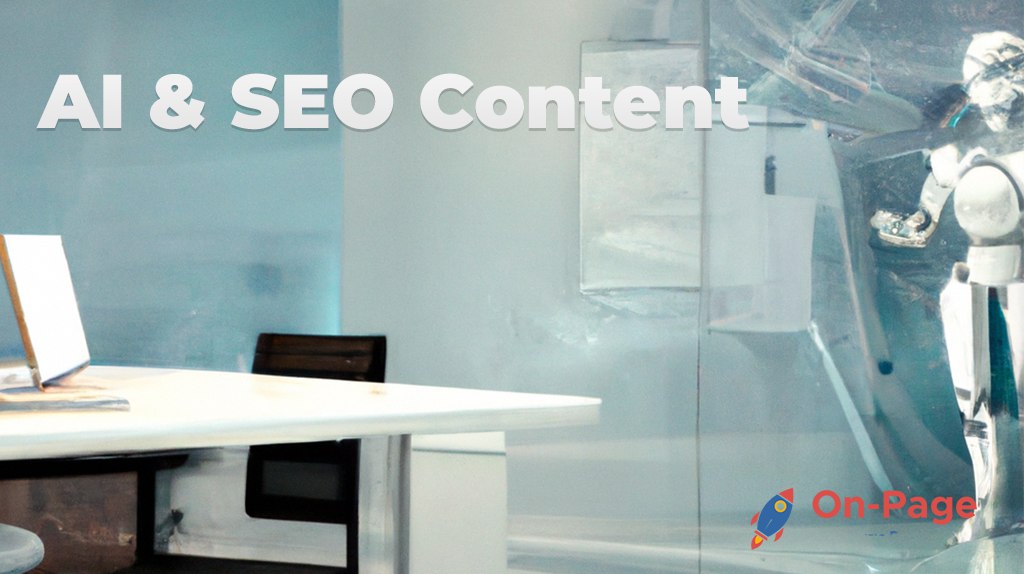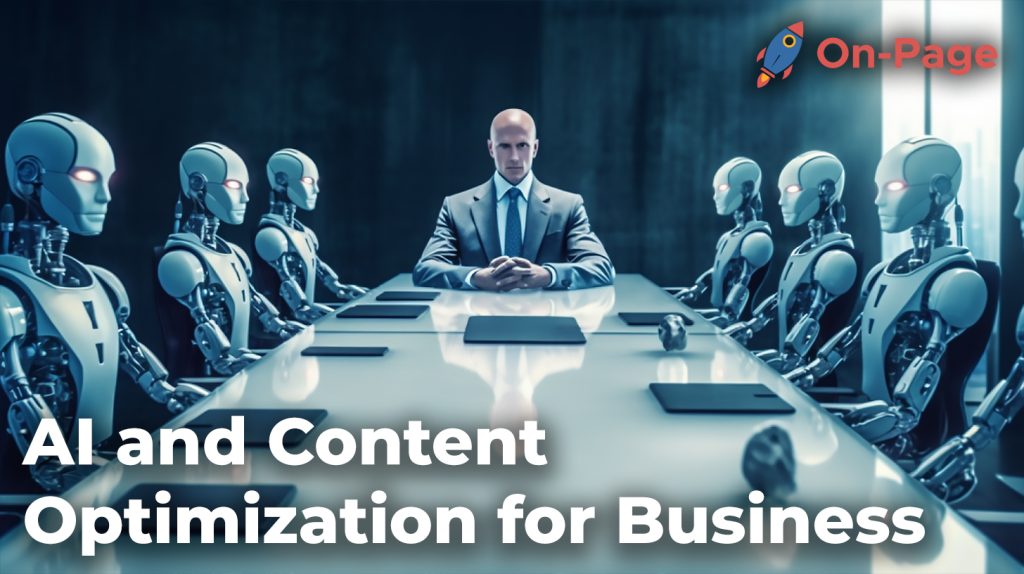
Imagine a world where your website effortlessly climbs the Search Engine Results Pages (SERPs), outshining your competitors and driving increased revenue for your business – all while you focus on honing the finer aspects of your enterprise. Welcome to the transformative realm of AI-driven content optimization! Unleashing this potent combination to supercharge your online presence is like harnessing a legion of tireless digital experts, relentless in their pursuit of SEO perfection. Keep reading to discover how artificial intelligence and content optimization can make your entrepreneurial dreams come true, unlocking unlimited potential and skyrocketing your business towards unparalleled success.
AI supports content optimization by using machine learning algorithms to analyze data and optimize content to be both relevant to users’ search queries and search engine friendly. The process includes four stages, including content discovery, content creation, AI content optimization, and content promotion. Using an AI-powered tool like On-Page.ai can help save time, inform your content strategy, avoid manual errors, and improve SEO at an affordable cost for businesses of all sizes. Despite the benefits of this technology, it’s important to note that humans are still needed for aspects such as fact-checking, critical thinking, and human editing in order to create high-quality content with consistent brand messaging.
How AI Can Automate Content Optimization
Artificial intelligence (AI) has transformed the way businesses approach content optimization. Through machine learning algorithms, AI can perform tasks that were once time-consuming and laborious for human beings. From analyzing user behavior to generating SEO-friendly content, AI is revolutionizing the way businesses optimize their content.
For instance, consider a business that produces multiple pieces of content on a daily basis. Manually optimizing each piece could take hours or days, and mistakes are bound to happen. With AI, this process can be automated, leading to both time savings and better search engine ranking results.
Beyond just saving time for businesses, AI can improve the quality of content produced. Through natural language processing (NLP), AI can analyze the relevance and readability of written content – making improvements where necessary. This ensures that readers receive high-quality content, written in a tone appropriate for their needs.
The way humans think differs from one individual to another, but with the power of AI machines, will produce relevant information that is appropriate for every reader based on their needs. It’s like having a library of books that cater to every possible niche and reader preference right at one’s fingertips!
Mass-producing optimized content has never been this effortless with the help of On-Page.ai. This AI content editor and optimization tool can quickly craft useful, engaging articles and other written pieces your business needs. And with its Auto-Optimize functionality, optimizing your content for the right keywords can be done automatically. How awesome is that?
To understand how AI automates the overall optimization process even further, we must look at how machine-learning plays a role in content discovery and creation.
- Artificial intelligence is transforming the way businesses approach content optimization by automating time-consuming tasks and improving the quality of content produced. Through NLP, AI analyzes the relevance and readability of written content, ensuring that readers receive high-quality content suitable for their needs. Machine learning algorithms used in AI make optimization even more efficient and effective, enabling businesses to save time and improve search engine rankings while catering to every possible niche and reader preference.
Machine-Learning in Content Discovery and Creation

Content discovery is the process of identifying topics and keywords around which businesses should base their content marketing strategy. Content creation is the actual production of this content. With machine-learning algorithms, these two crucial aspects of business can become almost effortless.
With the aid of AI-based recommendation systems, businesses can analyze industry trends and customer behavior – helping them develop an effective content marketing strategy. These systems use data obtained from user searches, browsing history, social media activity and other sources to provide tailored content recommendations. This means that businesses can rest assured that the content they create is relevant to both their target audience and search engine algorithms.
Some people have doubts about whether AI-content is credible. However, as long as the data fed into the machine models are accurate, and high-quality, then there’s no reason why automated content cannot be faultless! Also with human content editors checking out for errors and making sure the contents adhere to brand guidelines, the final output will be perfectly optimized.
Again, through natural language processing technologies, machines can predict what queries users will ask based on their recent search behavior. This allows businesses to create content around these predicted queries- thereby increasing relevancy and visibility to search engines.
One of the key benefits of using AI in content optimization is improved SEO rankings. In our next section, we shall delve into this topic even further.
Analyzing User Behavior and Metrics
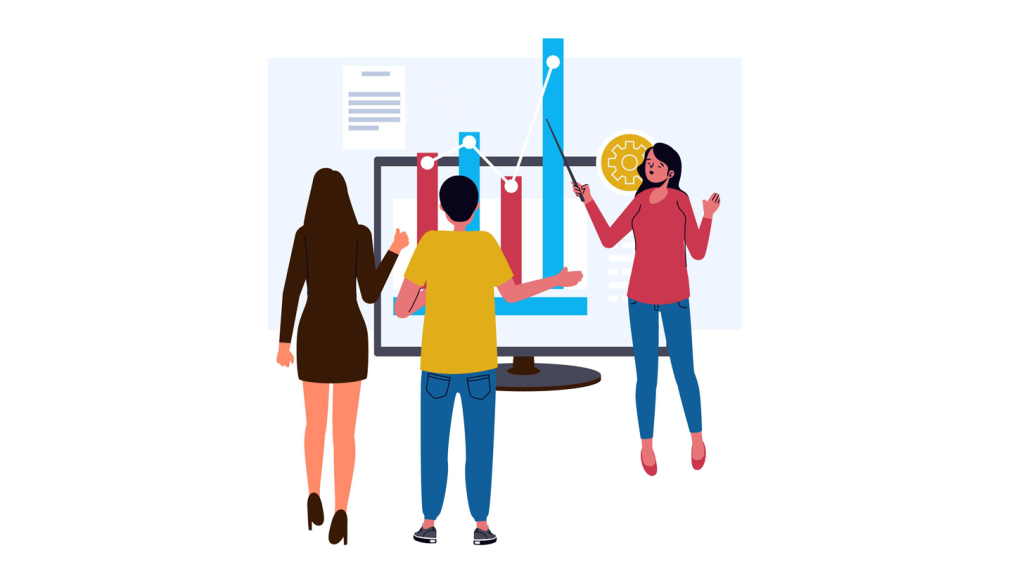
Analyzing user behavior and metrics is an essential part of any content optimization strategy. With the help of AI, businesses can easily identify patterns and insights into how users interact with their content. This information can be used to optimize a website’s design, content, and structure to provide a better user experience and improve search engine rankings.
For instance, by analyzing user behavior metrics such as bounce rates, time on page, click-through-rates, and conversion rates, businesses can assess how engaging their website content is for their target audience. They can then tweak their content to make it more compelling to their target audience while using AI-powered algorithms to assess what works best for that particular demographic.
In addition to this, the analysis of user behavior can also help marketers understand which channels are driving traffic to their site, the pages that generate the most traffic, and the actions users are taking once they land on a page. By using AI-powered tools like to analyze these metrics in real-time, businesses can quickly detect any issues or areas where there may be gaps in their strategy.
Of course, there is always the question of whether too much data analysis could lead to analysis paralysis. It is not uncommon for businesses that rely solely on data to find themselves going down rabbit holes and drawing conclusions from mountains of irrelevant data. Therefore, it’s essential to strike a balance between intuition and data when making business decisions based on user-behavior metrics.
Speaking of analysis, On-Page tool scans your keywords and website to further understand your business and competitors. In just seconds, it will come back with recommended keywords that you need to use to rank high and dominate your industry.
Think of analyzing user behavior like being a detective who needs to solve a case. A good detective would look at all the information they have available but would narrow down their search based on relevant clues rather than blindly following every piece of information that comes their way.
With that in mind, let’s explore some of the benefits and applications of AI optimization.
Benefits and Applications of AI Optimization
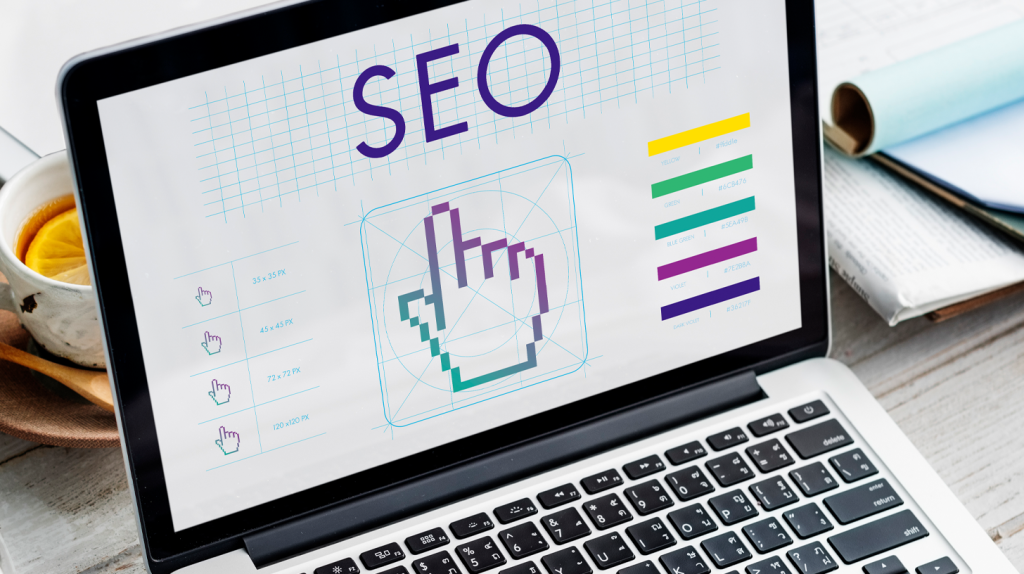
The benefits of using AI in content optimization are numerous. From time-savings to SEO improvements, businesses can see a significant impact on their bottom line by utilizing AI-powered tools.
Save time
Let’s take time-saving for instance. One of the most significant benefits of using AI in content optimization is that it significantly reduces the time needed to achieve results. Manually analyzing data and tweaking content to align with SEO best practices could take weeks, even months by traditional methods. On the other hand, with AI-powered tools, you can automate many processes like tagging keywords or generating descriptive meta-tags, saving you considerable time.
How amazing is it that you can forget about manual optimization when you have On-Page.ai’s Auto-Optimize feature? That’s right. It can instantly optimize your content to make sure it ranks high on SERPs and outperforms your competitors!
Better SEO results
Beyond just saving time, another critical benefit of AI-powered content optimization is that it delivers superior SEO performance compared to traditional marketing methods. By analyzing data on a web-page by page basis, marketers can efficiently identify gaps in their website’s optimizations, improve page relevance and increase search engine rankings. But only advanced SEO tools like On-Page can effectively help marketers and entrepreneurs drive their website rankings.
However, while there may be many benefits to using AI for content optimization, concerns around its use cannot be ignored. For instance, some people worry that relying too heavily on AI will lead to a loss of human touch when it comes to creating compelling content. Also, while automation saves time in the short term, it could lead to complacency in the long-term if done without oversight.
It’s essential to keep in mind that while using a hammer is efficient and effective at pounding nails into wood quickly; it doesn’t mean we should ignore other tools like screwdrivers or saws. The right tool for the job depends on the situation.
Now that we’ve explored some of the key benefits and applications of implementing AI solutions for your business let’s talk about some challenges and considerations surrounding its use.
Time Savings and SEO Improvement
One of the most significant benefits that AI optimization brings is time savings. In traditional, manual SEO efforts, optimizing content can be a very time-consuming task. However, with the use of AI-powered tools like On-Page.ai, this task can be accomplished much faster.
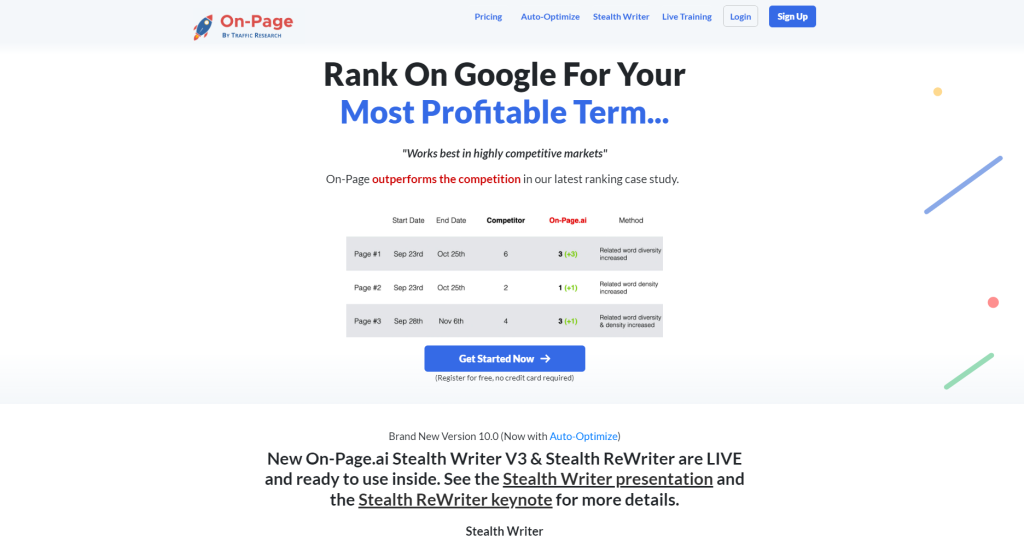
Machine learning algorithms help to identify the most effective changes that can be made to optimize content for search engines. This saves both time and effort because content creators do not need to spend hours analyzing data manually or trying to guess what keywords will work best.
For instance, a blogger who writes five articles per week will typically spend up to 6 hours optimizing them for search engines such as Google. If this blogger uses a tool like On-Page.ai, which is loaded with cutting-edge features like the Stealth AI Writer and ReWriter, he or she could reduce this time by 70% or more.
Additionally, AI optimization can help improve SEO by increasing relevance. By analyzing user behavior and metrics to identify what their audience is searching for, businesses can create more relevant content that better meets their customer’s needs.
For example, if an advertising company uses AI optimization on its website’s products and service pages and conducts keyword research to understand what customers are searching for in its niche market, it could easily tailor its digital strategy around these search phrases.
However, some might worry that relying too heavily on AI may lead to a loss of control over the content creation process.
To address this concern, it’s essential to think of AI like another team member who can assist in the creation process. When used correctly, AI can make life easier by identifying gaps in your current content strategy and generating ideas for new topics based on trends and user insights.
- In a study conducted by SEMrush, it was found that 91% of content gets no organic traffic from Google, indicating the importance of content optimization and AI’s potential role in improving these metrics.
- A 2020 Gartner report estimated that AI-generated marketing messages were expected to increase by 122% over the next five years, highlighting its growing significance in the field of content optimization.
- According to an Accenture study, 77% of surveyed marketing executives believe that by 2025, using artificial intelligence for content strategy and creation will lead to significant improvements in personalized and targeted user experiences.
AI-Assisted Content Strategy
AI has several applications beyond just the optimization of individual pieces of content; it also plays a vital role in the content strategy that dictates what topics are covered, when, and for whom.
With AI optimization tools, businesses can gain valuable insights into their audience’s interests and needs by analyzing how people interact with their websites or social media platforms. This analysis will help them create an effective content strategy aligned with those interests and preferences.
For example, if a fashion blog uses AI optimization to analyze the most popular search phrases in its niche market: high-waisted denim shorts. They might determine that these terms are often searched for on Fridays. This insight could drive their content calendar, with them promoting denim shorts heavily every Friday.
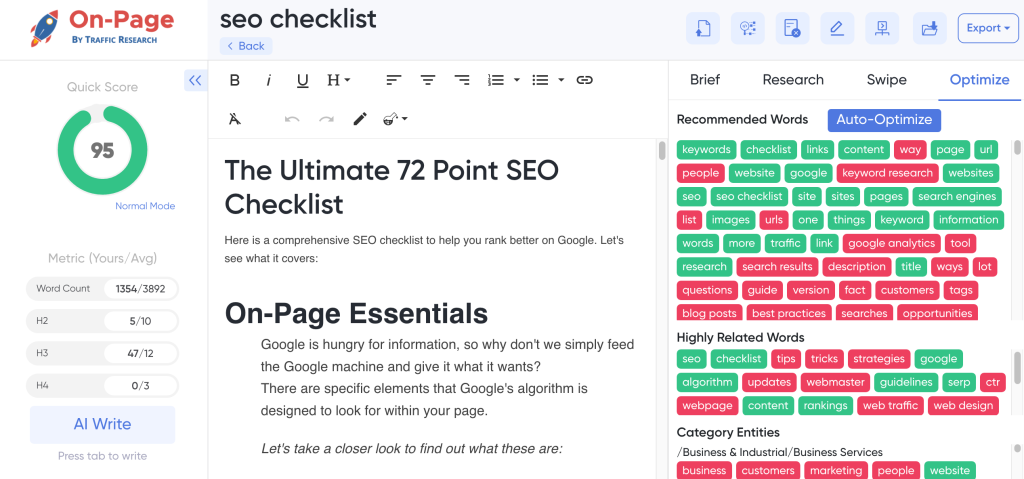
When businesses use AI optimization to inform their content strategy, they can observe a higher level of consistency in the themes across their marketing channels. This leads to more accurate targeting of the intended audience, thereby improving overall effectiveness.
Some critics argue that replacing human intuition with data-driven insights could lead to poorly written stories or articles lacking personality and individuality. This is not always the case, as On-Page Stealth Writer, for instance, writes interesting articles–not just informative ones. They can truly pass as human-written content, maybe even better!
But AI-based tools aren’t taking over the creative process entirely but are helping us do our jobs better by identifying opportunities where we can improve faster than ever before. Think of it as being a lot like having a trusted colleague who can offer insights into areas you may have overlooked previously.
Challenges & Considerations Surrounding AI Content Optimization

While AI optimization provides several benefits, it also poses certain challenges and considerations for businesses to keep in mind. Incorporating artificial intelligence into content optimization can be complex and expensive. Here are some of the main concerns you should consider before adopting an AI-driven content optimization approach.
Lack of human touch
One of the key challenges surrounding AI content optimization is the fact that machine-generated content often lacks a human touch. While AI algorithms are designed to support the creation of optimized content, they cannot replicate the creativity and emotional resonance conveyed by human writers. The result is keyword-stuffed content that sounds robotic and fails to connect with readers on a personal level. It is important to balance the need for SEO optimization with maintaining a relatable voice in your brand’s content.
Invalid and inaccurate data
Another issue that businesses face when implementing AI-based content optimization revolves around data validity and accuracy. As with any digital system, the success of an algorithm depends on quality data inputs – if an algorithm is learning from poor quality or incomplete data points then this will negatively impact its ability to deliver results. Companies must ensure that their data sources are reliable and correctly labeled, as well as frequently audit feeds so that mistakes can be corrected.
Cost
Cost is another compelling factor for organizations looking to integrate AI technologies into their content optimization mix. While these tools improve efficiency by automating mundane tasks like rewriting text multiple times or fact-checking sources, they require an investment upfront in setup costs and maintenance fees. For smaller companies or start-ups with limited budgets, the expense of laboriously configuring algorithms may not make sense given other pressing business needs.
It’s important to remember that machine-learning-powered systems evolve over time based on their experiences and receive input from outside sources. They can potentially amplify biases present in training data which creates less inclusive and accessible content options. In essence, AI optimization is like planting a tree— it takes time for the tree to grow and reach an ideal size. With more data inputs and advanced technology, it takes time for AI systems to progress and improve outcomes. Companies must continually review these algorithms to ensure that they are performing optimally and there are no bias concerns.
Implementing AI Solutions in Your Business
With these challenges in mind, businesses can still benefit from using AI technology for their content optimization efforts. Here are some tips on how to implement an AI-driven solution in your business that works best for you.

Define your goals
Start by setting clear goals: having objectives in mind will help track performance progress and provide insight into which solutions work better. For example, decide which processes in particular workflows you would like to automate so that processes become more efficient or which SEO KPIs you would like to improve through the use of automated content generation. Defining measurable objectives will enable you to determine early on whether implementing an AI system was actually worthwhile.
Have a solid database
It’s crucial to have a solid database infrastructure in place before incorporating machine learning into your content optimization strategy. Make sure your data sources are reliable and consistently labeled throughout the feeds used with your algorithmic toolset; this would help gain optimum results later on. Clean data makes way for better results when algorithms begin processing information.
Trust only reliable AI companies
Consider investing in a reputable start-up or hiring third-party professionals who are knowledgeable about artificial intelligence to help bring this new technology into your business mindset. However, given most businesses don’t have large budgets for in-house software engineering teams capable of developing tailored algorithms or the resources to train and validate models, small businesses may have greater success utilizing pre-packaged suites offered by established vendors such as On-page.ai.
Integrating AI solutions into content optimization is like inviting a team of experts aboard your ship. They may not know all the ins and outs of your business, but they come with expertise that can be leveraged to help improve your content strategy. When setting up an AI solution, like On-page.ai, for your organization’s needs, ensure that you clearly outline expectations for what defines success.
Finally, when using any form of technology, always remember that it is a tool designed to aid or augment the work done by professional partners in-house. While the implementation process may be challenging at times – stay committed and true to both strategic goals and company values. It’s important to realize the value of technology in enhancing workflow efficiencies and driving growth.
Selecting Reputable AI Optimization Tools
When it comes to selecting an AI optimization tool for your business, it is important to choose a reputable provider that offers reliable and accurate results. With so many options available in the market, it can be overwhelming to make a decision. Here are some factors to consider when choosing an AI optimization tool:
Firstly, it is important to look for a solution that is specifically designed for content optimization. General-purpose AI tools may not provide the level of optimization required to achieve improved search engine rankings. On the other hand, specialized AI solutions designed for content optimization provide more accurate recommendations to help you create high-quality content.
On-Page.ai specializes in content optimization with the help of advanced AI and NLP. If you’re looking to double down on your content marketing strategy and stay ahead of your competitors, it’s time to take advantage of this AI content generator before it’s too late.
Secondly, consider the features and capabilities offered by the provider. An effective AI optimization tool should automate repetitive tasks, such as identifying keywords and tags, creating optimized headlines and meta descriptions while suggesting ways to make improvements on page-load times and readability scores. It should also be capable of analyzing user behavior and metrics to generate insights on what resonates with your target audience.
While selecting an AI solution for content optimization, it’s worth considering if the tool can integrate with any systems or technology stacks you are currently using in your business. Integration between different tools, services or software tends to improve operational efficiencies by reducing manual processes and increasing automation.
At this point, we may ask ourselves why should we invest in an AI optimization tool? The answer lies in the fact that businesses today need regular updates regarding customer behavior and fluctuations in traffic patterns in order to stay relevant. A good analogy would be investing in vehicles equipped with GPS technology; simply put- GPS navigation saves time and helps drivers arrive at their destination safely while avoiding unwanted traffic or roadblocks.
Finally, most importantly – before selecting any AI optimization tool – ensure that it aligns with your business goals and objectives. Be certain it provides a clear pricing structure, without any hidden fees, while also providing training and support throughout the process. This will help you avoid any pitfalls associated with automating your content optimization efforts.
With all these factors considered, the answer for the best AI optimization tool is clear: On-Page.ai stands out in the market as one of the most reputable and reliable AI solutions for content optimization. The advanced features within On-Page are designed to deliver high-quality results, helping businesses improve their search engine rankings and domain authority.
Sign up today and let’s help you overthrow your #1 competitor!

